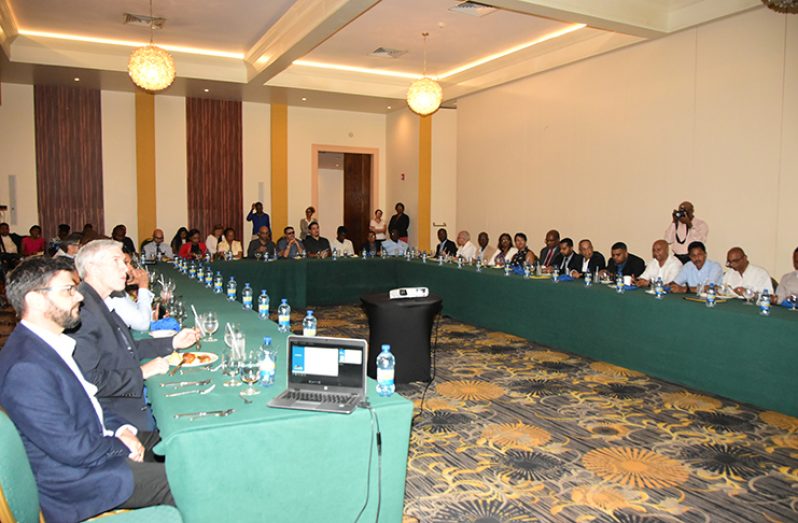…but expert warns against hurdles to local equity ownership of joint ventures
EVEN though the second draft of Guyana’s local content policy framework has received good reviews from local content expert Dr Michael Warner, he has warned that some aspects of the said policy must be examined carefully as they could result in several risks being taken.
He was at the time addressing private sector representatives at a lunch meeting held at the Pegasus Hotel on Wednesday. Dr Warner, who has about 20 years’ experience in the area of local content, explained that it is his personal view that the policy for the most part is sound.
He spoke to the existing limitations of the local economy and the uncertainty of the industry, upgrading Guyanese firms, individuals and institutions to meet industry standards, increasing and sustaining the value retained in the local economy from employment and provision of goods and services, and partnering mechanisms for technology transfer.
However, Dr Warner expressed concern about the mandated minimum requirements for local equity ownership of joint ventures; supplier certification. He noted that there would be project risks if international and local joint ventures are hurdles to market access. “Be careful not to set hurdles…think about it carefully,” said the expert, who called for more attention to be paid to this particular aspect with respect to the potential risks.
“It is a small economy; it is going to be a lot of work, a huge amount [of] opportunities for local firms,” the expert said, noting that the problem would not be under-demand but over-demand. As such, he stressed that suppliers would have to raise their game and meet the international standards needed.
Another area he believes needs to receive greater attention is the management rather than avoidance of project risks of new local suppliers. “Some risks are going to be taken to ensure that local or Guyanese suppliers get maximum opportunities in the market. He said identifying scale of risks is critical, while noting that same can be mitigated through, inter alia, supplier upgrading, TVET programmes, on-the-job training, international and local partnerships, evidence-based bundling, or unbundling and major contract LCPs. That aside, Dr Warner posited that the policy-implementation strategy is rooted in a pragmatic and collaborative approach, as he pointed to reporting mechanisms which seek to assure objectives and goals of the policy are achieved. “The policy is absolutely heading in the right direction, but the question now is how to implement the policy framework.”
He referenced quotes taken from pages 23 and 24 of the policy, which speak to limitations and uncertainty as to the future potential level of activities and the demand for goods and services that will be required, as well as investments to facilitate and support capacity-building for Guyanese to participate in the budding oil and gas sector, it was noted that there is need for a well-considered, strategic and flexible plan, which can adapt to changing circumstances around the state of the petroleum resource base, activity levels and the capacity of the local supply chain.
The expert then pointed to the five principles for implementing the policy framework: well-considered, strategic, flexible, pragmatic and staged. “The implementation of the policy does not need an external adviser to come along and say how to implement…they are written in the policy,” said Dr Warner.
In considering the five principles, the local content expert said, the policy’s use of the term, “well-considered” means everything will be based on evidence and a collaborative approach. As it relates to a strategy, he said the framework speaks to a balance between achieving local content policy, national economic or fiscal policy[ revenues and the avoidance of the Dutch Disease], competitive investment climate, a stable and enabling petroleum sector.
There must be flexibility to activity levels and opportunities for the local supplier and labour markets as well as changing circumstances. “Flexible…is a key lesson for any frontier country…things are moving very fast here. Whatever the design of the policy, it needs to be flexible,” said the local content specialist.
“This is a changing sector, a changing economic environment here. The sector will affect the rest of the economy here and so there needs to be flexibility in the implementation of the policy,” he told the gathering of private sector officials.
In implementing measures in a pragmatic and staged manner, the Government of Guyana will be making risk-based decisions. Dr Warner noted placing safety first and the issuance of timely visas as well as setting realistic targets. Additionally, there ought to be a staggered implementation of policy instruments, supply and demand forecasts, supplier development, TVET, reporting systems, local content plans, procurement processes, targets and mid or downstream investments.
Turning his attention to what he calls “instruments for implementation” of the policy framework, Dr Warner said demand and supply forecasts, local content plans and measurement, procurement, workforce and training must all be thoroughly be examined.
Dr Warner is the Director and Founder of Local Content Solutions Ltd; former Local Content and Supply Chain Sustainability Manager for BG Group; former Coordinator for World Bank Business Partners for Development Programmes, Extractive Industries; and former Research Fellow with Economic Group, Overseas Development Institute.
His presentation Wednesday was facilitated by DAI, the development company which manages ExxonMobil’s Centre for Local Business Development.



.jpg)








